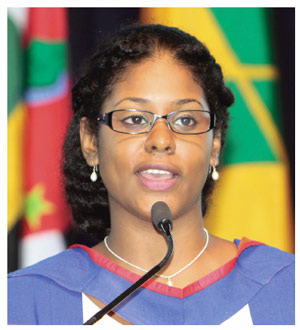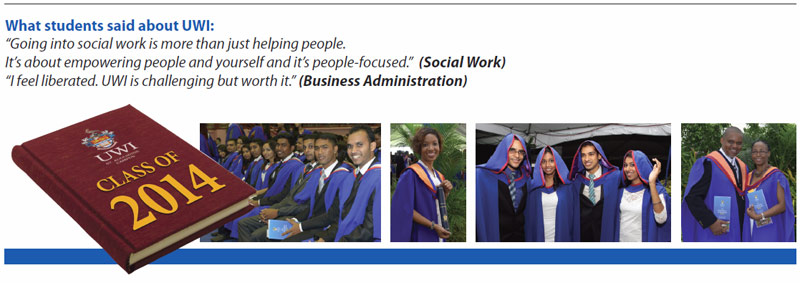 |
 |
 |
|
December 2014 |
I stand before you today humbled to be given this opportunity to be this year’s valedictorian for the Faculty of Social Sciences. I am proud to represent not only the largest, most diverse, and in my opinion, outstanding Faculty; but also my fellow Social Work colleagues and our degree programme; which is sometimes seen as miniscule in the scope of things, but is one which resonates a colossal passion for people. At times like these, a speech usually extols the virtues of attending this prestigious institution. While this is worthwhile, I want to start if I may, with my own impressions of life at The University of the West Indies, St. Augustine campus and seek your indulgence to follow me on a trip down memory lane. I am pretty sure our sentiments at the beginning of this journey were somewhat along the lines of Sylvia Plath’s when she said, “I wanted change and excitement and to shoot off in all directions myself, like the coloured arrows from a Fourth of July rocket.” We were all looking forward to a new experience: the UWI life. We all had different assumptions of what this UWI life would entail: living in our own apartment, some of us rooming with our closest friends; embarking on and continuing our wild adventures; taking on adult responsibilities and for the more mature students, having to put up with these hormone crazed children just out of secondary school. Many of us “Southies” can remember driving around for hours with our parents, trying to find a suitable apartment that didn’t feel like a rat hole or cost a pound and a crown; bussing our parents’ pockets getting said apartments prepared and trying to navigate this new territory called the East. Although we were ready to start a new chapter of our lives, we would soon realise some of the expectations and old wives’ tales of the UWI life were not at all close to reality. For my fellow Social Work students and me, we were forever reminded, as the semester progressed, that one semester could never, ever have enough days, minutes or hours to complete the required tasks presented to us and still maintain some form of a social life. We would soon recognize we were experiencing an all-in-the-same-boat phenomenon, as all around the Social Sciences Faculty we could hear the cries of our fellow students which sounded a lot like this: “This lecturer feel I only have time for his/her course or what?” It often felt as though every course required us to read five hundred pages a week just to keep up; attend tutorials (which we all loved so much), prepare for midterms, slave behind the ever anticipated group projects and still maintain some semblance of sanity all at the same time. Although I’m sure each course brought with it its own horrors and tortures that would cause classroom numbers to dwindle and lecturers and tutors to keep a tighter leash on “the roll,” there was one foundation course that I’m sure we can all agree was unique and another which consistently wins the award for most disliked and unanticipated course each year. The top ranking course among most first-years, at least among my colleagues, required us to arrive an hour early and when the doors of Daaga were opened, one would have to push, rush and sometimes even trample over one another just to get a seat. This was a class that felt less like a class and more so a lime; where jokes and conversations were rooted in our Caribbean history and of course had to include a weekly reference of the ill effects of KFC (although photo evidence was presented against our lecturer as he was later caught red-handed in the KFC line). This course, as most of you all would have guessed was Caribbean Civilisation and I’m sure it is one most of us will never forget. The other, is one that we each pray the grace of God will find us and aid us in being one of the eeny meeny miny mo’s who gets chosen to pass. English for Academic Purposes: a course which has unravelled a few of us and which most of us are thankful is over and will never be seen again (we hope). Many of us may also agree that Survey Design and Analysis is also a strong contender in this category. So, our foundation courses were over, year one ended and years two and three brought with them their own challenges as our degree programmes became more specialised. We all have our own experiences and memories from those two latter years; whether or not they included: late nights in SAC studying for exams, taking full advantage of free JAPS and Manov’s cafe, surviving on Ramen noodles and $20 specials, being part of the cheering crowd on football match days when seats in SAC and the food court were limited or partaking in the countless all fours championships that occurred any and everywhere and at any time around campus. Those memories we have created will forever paint our mood about the time we spent here. Although these memories will never be forgotten, the word memory in itself indicates the past. We are at the finish line. Gone are the days when exams, mid-terms and group projects cause us to metamorphose into zombies. We have earned our freedom and are no longer shackled to our degree programmes but we have now become professionals in our various fields. To borrow from the words of Aristotle, “the roots of education are bitter but the fruit is sweet.” We have earned our pieces of parchment paper and achieved our greatest goal while attending UWI: to finish. So now what? Many of us would answer and say: get a job, make money, start a family, get my masters and so on. However, should we let the achievement of this certificate limit what we can do or categorise us into stereotypical graduate behaviour? I say no. I challenge us today to change our perspective of what we have achieved. No one wants to be defined by a piece of paper. This certificate is merely proof that we have attended classes and made several sacrifices to become educated. It does not define or limit who we can become and the things that we can achieve. There is more purpose buried within us and we must strive to release it. In this room, are our future businessmen and businesswomen; politicians, researchers, managers of major state-owned and private companies, economists, psychologists, accountants, social workers, lecturers and the list goes on. As you can see, the possibilities for the future, as a student of this faculty, are endless. Before you ladies and gentlemen, are the leaders of not only the future but our society. I urge you to understand, my fellow graduates, who we really are. In essence, we have all chosen to become social scientists, and in so doing, we have not only accepted a responsibility to 1.3 million people to build a better tomorrow but also to the institutions and their functioning in our society. Hence, we can no longer become complacent, holding onto our pieces of paper in our scrolls. We have a mandate to forge out in different parts of this vineyard called Trinidad and Tobago as the change agents that we were mentored to be in our various disciplines. As Bono articulated to graduates of the University of Pennsylvania in 2004, “The world is more malleable than you think and it’s waiting for you to hammer it into shape…That’s what this degree of yours is – a blunt instrument. So go forth and build something with it.” Strike a spark, light a candle, and allow your flames to spread like a forest fire so that our world can become a better place. I warn you, let not your motivation reside solely in the compensation packages you hope to receive but rather, strive to give selfless service to all humanity. After all, for those of us in the Social Work discipline, we have tirelessly heard the refrain, “If yuh chose this profession for money, then this is the wrong profession for you.” This does not go to say that money is not important, but as practitioners of the social sciences our main concern should and ought to always be, service to others and the development of our nation. Also, remember to be true to self in all that you do and the ways in which you choose to do it, for “the unfortunate, yet truly exciting thing about your life, is that there is no core curriculum, the entire place is an elective.” Fellow graduates, as we step forth into a vast sea of potential, let us pause to remember those who have taught us how to swim. Firstly, we must thank Almighty God for His grace and guidance throughout this arduous journey. For without Him, none of us would be seated here today. To our lecturers, those we admired and those who challenged every bit of our patience, all of you have truly disproved the old adage, “Those who can’t do, teach.” You have not only shared the fundamentals of our disciplines with us, but you have educated a future generation and created a legacy for yourself. For that, you should be proud and we applaud you. To our families and friends, whose support, especially financial, we could not do without, we thank you. I would like to personally thank my fellow Social Work colleagues, for without your help, encouragement, debates, rant and raves, support, late night study groups and before the exam crams; I know I would not be standing here today; hugs and kisses to you all. I would also like to thank Google books and BibMe, for without these resources, our bibliographies and assignments would have been mighty short and terribly inaccurate. Finally, I would like to thank The University of the West Indies, and by extension the nation of Trinidad and Tobago, for allowing us the opportunity to receive free tertiary education and enabling us to study and understand how each of our disciplines apply to our Caribbean context. It is an investment in the future that I am sure none of us will regret. Fellow graduates, we now return you to your regularly scheduled life; and congratulations on completing what you have set out to do: obtain a university degree. I wish you all continued success and I look forward to the future we shall all create together. Ladies and Gentlemen, and especially my fellow graduates, I choose to close with the words of Sheryl Sandburg COO of Facebook, which should serve as a constant reminder of the beauty you can find in the challenges that may await you, especially as you seek employment. “There is no straight path from your seat today to where you are going. Don’t try to draw that line. You will not just get it wrong, you’ll miss big opportunities. And I mean big. Careers are not ladders, those days are long gone, but jungle gyms. Don’t just move up and down; don’t just look up; look backwards, sideways and around corners. Your career and your life will have starts and stops and zigs and zags. Don’t stress out about the white space—the path you can’t draw— because therein lies both the surprises and the opportunities.”\ Thank you.
|




